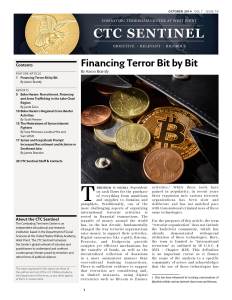Cover Story Overview
Financing Terror Bit by Bit
By Aaron Brantly
Terrorism is highly dependent on cash flows for the purchase of everything from munitions and supplies to domains and pamphlets. Traditionally, one of the more challenging aspects of organizing international terrorist activities is rooted in financial transactions. The transfer of money around the world has, in the last decade, fundamentally changed the way terrorist organizations raise money to support their activities. Digital currencies like e-gold, Bitcoin, Peercoin, and Dodgecoin provide complex yet efficient mechanisms for the transfer of funds, as well as the decentralized collection of donations in a more anonymous manner than conventional banking transactions. While these tools have gained in popularity, in recent years their expansion into various terrorist organizations has been slow and deliberate and has not matched pace with transnational criminal uses of these same technologies. This article is designed to demonstrate the advantages and limitations of the use of digital currencies by illicit actors, specifically jihadists. Focus is placed on the technological problems posed to terrorist organizations in leveraging these currencies, as well as the benefits associated with their use. Furthermore, this analysis demonstrates, in brief, the technical challenges faced by law enforcement and intelligence agencies engaged in anti-money laundering and countering the financing of terrorism endeavors.
 Skip to content
Skip to content

